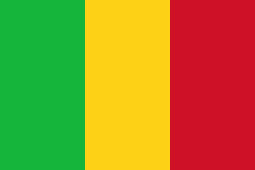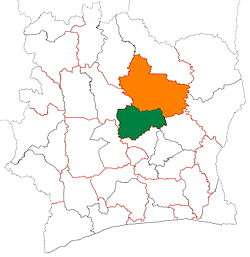Bouaké
| Bouaké Bwake | |
|---|---|
| City, sub-prefecture, and commune | |
|
University hospital complex of Bouaké | |
 Bouaké Location within Ivory Coast | |
| Coordinates: 7°41′N 5°1′W / 7.683°N 5.017°W | |
| Country |
|
| District | Vallée du Bandama |
| Region | Gbêkê |
| Department | Bouaké |
| Founded | 1899 |
| Area | |
| • City, sub-prefecture, and commune | 71.788 km2 (27.718 sq mi) |
| Elevation | 312 m (1,024 ft) |
| Population (2014)[1] | |
| • City, sub-prefecture, and commune | 536,189 |
| • Density | 7,500/km2 (19,000/sq mi) |
| • Metro | 680,694 |
| Time zone | GMT (UTC+0) |
| Website |
mairiebke |
Bouaké (or Bwake) is the second-largest city in Ivory Coast, with a population of 536,189 (2014 census). It is the seat of three levels of subdivision—Vallée du Bandama District, Gbêkê Region, and Bouaké Department. The city is located in the central part of Ivory Coast about 50 kilometres (31 mi) northeast of Lake Kossou, the country's largest lake. It is approximately 350 kilometres (220 mi) north of Abidjan on the Abidjan-Niger Railway and about 100 kilometres (62 mi) northeast of Yamoussoukro, the capital of the country.
Bouaké is a centre for the Baoulé people and is known for its crafts. The economy is based on the cotton industry. The city largely grew from the 1970s after the construction of the power station at Kossou Lake flooded land to the west of the city. Bouaké is known for its large carnival and market and for the St Michael's Cathedral. The city has a large airport located north-west of the city with a 3,300 metres (10,800 ft) runway. Celtic F.C defender Kolo Touré and his brothers Yaya Touré and Ibrahim Touré were born in Bouaké.
Demographics
| Year | Population |
| 1921 | 3,600 |
| 1945 | 22 000 |
| 1960 | 60,000 |
| 1970 | 120,000 |
| 1975C | 175,000 |
| 1988C | 329,850 |
| 1998C | 461,618 |
| 2014C | 542,000 |
History
Bouaké was established as a French military post in 1899 and has been an administrative center since 1914.
French and United Nations peacekeepers currently reside in the city as part of an enforced ceasefire between the rebel-held north and the government-held south. After the attempt to overthrow the president Laurent Gbagbo had failed, the rebel forces FN (forces nouvelles) led by Guillaume Soro made Bouaké their center of control. Subsequently, Bouaké University, opened in 1996, was closed down in September 2002. Financed by Unesco, the university reopened in April, 2005.
On 4 November 2004, governmental forces used Sukhoi-25s to raid the city as an opening movement towards "territorial liberation," according to Captain Jean-Noël Abbey of the Côte d'Ivoire army. Korhogo, 225 kilometres (140 miles) north of Bouaké, was also targeted.
Climate
Köppen-Geiger climate classification system classifies its climate as tropical wet and dry (Aw).[2]
| Climate data for Bouaké | |||||||||||||
|---|---|---|---|---|---|---|---|---|---|---|---|---|---|
| Month | Jan | Feb | Mar | Apr | May | Jun | Jul | Aug | Sep | Oct | Nov | Dec | Year |
| Average high °C (°F) | 33.0 (91.4) |
33.5 (92.3) |
33.8 (92.8) |
32.7 (90.9) |
31.0 (87.8) |
29.9 (85.8) |
27.8 (82) |
27.7 (81.9) |
28.5 (83.3) |
30.1 (86.2) |
31.3 (88.3) |
31.7 (89.1) |
30.9 (87.6) |
| Daily mean °C (°F) | 26.6 (79.9) |
27.8 (82) |
27.8 (82) |
27.0 (80.6) |
26.1 (79) |
25.0 (77) |
24.1 (75.4) |
23.8 (74.8) |
24.3 (75.7) |
25.0 (77) |
25.7 (78.3) |
25.7 (78.3) |
25.7 (78.3) |
| Average low °C (°F) | 20.6 (69.1) |
21.8 (71.2) |
22.3 (72.1) |
22.0 (71.6) |
21.7 (71.1) |
21.2 (70.2) |
20.8 (69.4) |
20.9 (69.6) |
21.1 (70) |
21.3 (70.3) |
21.3 (70.3) |
20.3 (68.5) |
21.3 (70.3) |
| Average precipitation mm (inches) | 12.5 (0.492) |
40.0 (1.575) |
83.8 (3.299) |
126.4 (4.976) |
123.7 (4.87) |
147.2 (5.795) |
117.5 (4.626) |
128.0 (5.039) |
168.1 (6.618) |
107.9 (4.248) |
30.2 (1.189) |
14.6 (0.575) |
1,099.9 (43.303) |
| Mean monthly sunshine hours | 226.5 | 206.6 | 201.4 | 194.2 | 202.3 | 129.7 | 97.7 | 90.6 | 122.8 | 174.0 | 184.7 | 188.0 | 2,018.5 |
| Source #1: NOAA[3] | |||||||||||||
| Source #2: Climate Charts (latitude: 07°44'N; longitude: 005°04'W; elevation: 376m)[4] | |||||||||||||
Economy
Tobacco products, building materials, and textiles are produced, and cotton sisal and rice are processed. Gold, mercury, and manganese are found nearby. The overall economy was shaken during the near decade long rebel rule that started in 2002. Many companies either shut down or relocated to Abidjan, Ivory Coast’s coastal economic hub. These events resulted in the 60% reduction in formal employment. For example, the city’s biggest textile mill, the Gonfreville Establishment, saw an employment decrease of 1200 workers, an 80% reduction. Economic recovery was slow until the early 2010s. After the State took back control of Bouake after the 2010-2011 election, the economy moved into a state of reconstruction. Roads were repaved after years of neglect, which allowed the transportation of goods to become an easier task. Cash crops such as cotton and cashews started to be transported in higher quantities to be processed in Bouake. Singapore-based Olam opened a cashew processing plant in Bouake in 2012, which accounts for nearly 2400 jobs. The agribusiness as a whole is beginning to turn to its original state before the rebel conflict. Additionally, banks have opened new branches and supermarkets have returned to normal operation. The government is stimulating this regrowth through policies, such as price floors, and projects to increase trade, including the construction of a highway to connect Bouake to the nation’s capital, Yamoussoukro.
Education
|
Higher education
Primary Schools
|
Secondary Schools
Semi-Public
Private
Public Colleges
Private Colleges
|
Administration
| Date elected | Name | Party |
|---|---|---|
| 1960 | Djibo Sounkalo | PDCI-RDA |
| 1980 | Konan Blédou | PDCI-RDA |
| 1985 | Konan Blédou | PDCI-RDA |
| 1990 | Konan Antoine | PDCI-RDA |
| 1995 | Konan Konan Denis | PDCI-RDA |
| 2000 | Fanny Ibrahima | RDR |
Subdivisions
The city itself is a sub-prefectures of Bouaké Department; the surrounding suburbs that are outside of the city limits are also organised into a sub-prefecture known as "Bouaké-SP". Bouaké is also a commune.
Religion
The city is the seat of the Roman Catholic Archdiocese of Bouaké. The cathedral of the archdiocese is the Cathédrale Sainte Thérèse in Bouaké. Since 1960, Bouaké has also been home to a Benedictine monastery, Monastère Bénédictin Sainte-Marie. However, the city is predominantly Muslim.
Sport
Brothers Kolo Touré, of Celtic F.C., and Yaya Toure, midfielder of Manchester City, were born in Bouaké.
International relations
Twin towns — Sister cities
 Mopti, Mali
Mopti, Mali Brescia, Italy
Brescia, Italy Beersheba, Israel
Beersheba, Israel Villeneuve-sur-Lot, France
Villeneuve-sur-Lot, France Reutlingen, Germany
Reutlingen, Germany Zimnicea, Romania[6]
Zimnicea, Romania[6]
References
- ↑ "Côte d'Ivoire". geohive.com. Retrieved 5 December 2015.
- ↑ "Climate: Bouaké - Climate graph, Temperature graph, Climate table". Climate-Data.org. Retrieved 30 November 2013.
- ↑ "Bouaké–Aero Climate Normals 1961–1990". National Oceanic and Atmospheric Administration. Retrieved 21 December 2015.
- ↑ "Bouake - Aero, Ivory Coast: Climate, Global Warming, and Daylight Charts and Data". Climate Charts. Retrieved 30 November 2013.
- ↑ "Villes amies de Bouaké" [Twin towns with Bouaké] (in French). mairiebke.e-monsite.com. Retrieved 20 August 2014.
- ↑ "Lista municipiilor înfrățite din România" [List of municipality twinnings in Romania] (in Romanian). Archived from the original on 13 August 2011.
External links
- Bouaké Travel Guide from World66
Coordinates: 7°41′N 5°1′W / 7.683°N 5.017°W
| | |||||||||
|---|---|---|---|---|---|---|---|---|---|
| Rank | Name | District | Pop. | ||||||
| Abidjan |
1 | Abidjan | Abidjan | 4 395 243 | |||||
| 2 | Bouaké | Vallée du Bandama | 536 189 | ||||||
| 3 | Daloa | Sassandra-Marahoué | 319 427 | ||||||
| 4 | Korhogo | Savanes | 286 071 | ||||||
| 5 | Yamoussoukro | Yamoussoukro | 281 735 | ||||||
| 6 | San-Pédro | Bas-Sassandra | 261 616 | ||||||
| 7 | Gagnoa | Gôh-Djiboua | 213 918 | ||||||
| 8 | Man | Montagnes | 188 704 | ||||||
| 9 | Duékoué | Montagnes | 185 344 | ||||||
| 10 | Divo | Bas-Sassandra | 179 455 | ||||||
